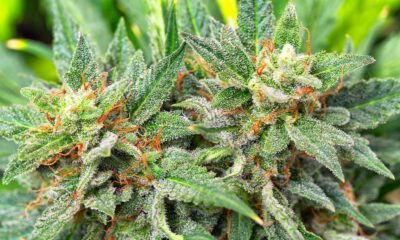
Joint Opinions
‘Marijuana Addiction’ Is Among the Least of America’s Problems
It’s real, but it’s not spectacular and pretending otherwise reeks of a bad-faith effort to repeal much more dishonest and deleterious prohibition.
Contrary to what you may have heard in “Half Baked,” made in the 1990s when people who can today purchase cannabis legally were not yet born, marijuana is a drug. And one need not scrape the littoral bottom of personal and public humiliation in order to qualify as an addict.
And the bar for when substance use morphs into abuse — that is, a bona fide, clinical “problem” — is much lower (or higher, if your perspective is from the position of this mythical rock-bottom). If you miss work or school, if your relationships become strained, or if your “normal” day-to-day is otherwise impacted thanks to your substance abuse —or, if at any time, you decide you want to stop and find that you cannot — you, friend, have a problem.
But it is possible to acknowledge marijuana addiction or dependence as real while simultaneously placing these issues in their proper context. That is not what The Atlantic did on Monday, when it published a lengthy article titled “America’s Invisible Pot Addicts.”
Among cannabis advocates, The Atlanticis already playing from behind, despite its left-of-center reputation, having in recent years published articles “asking” “Is Marijuana More Addictive Than Alcohol?” and declaring “The Failed Promise of Legal Pot.”
This is not an improvement — and, in fact, fits neatly in this milieu of overblown concern-trolling.
While the article is much more nuanced than the headline — as some of the subjects in the story themselves point out — and is a mostly-decent read, it’s a fundamentally bad take.
Worse, thanks to some maybe well-intentioned signal-boosting from media influencers, it’s bound to be employed by bad-faith actors in their quest to keep marijuana prohibition alive at all costs.
@AnnieLowrey‘s story is very good.
The hed and subhed, not so good:
Daily/near-daily use =/= “near-constant use”;
only about half of D/ND users have cannabis use disorder;
and fewer than one-third of those
have the chronic, relapsing CUD
that justifies the label “addiction.” https://t.co/aJMD7NKPWS— Mark A.R. Kleiman (@MarkARKleiman) August 20, 2018
The Atlantic says: Marijuana addiction is real, the long-term effects of today’s high-potency pot are largely unknown, claims that marijuana is a benign substance that’s “harmless” and “natural” are lies — and a “loosely regulated” marijuana industry is being “reckless[ly]” unleashed on a credulous, unsuspecting public.
Most of this is true. The studies we have telling us what cannabis does to the brain and body are mostly old. The test subjects used different, weaker cannabis than what we can buy and have brought to us using our smartphones. And while the stakes are much, much lower, as is the chance of misadventure, marijuana is not harmless.
There are absolutely bad actors who spray their plants with banned fungicides, use ill-trained, poorly paid budtenders to make all kinds of grandiose promises, and otherwise subordinate their customers’ well-being to the pursuit of profit.
But an America where marijuana legalization is not regulated is being recklessly foisted upon us without second thought exists only in fantasy. The rollout of legalization and medical marijuana both has happened only with delay after delay. Marijuana was legalized almost two years ago in Massachusetts and Maine, and in both states, recreational consumers have yet to buy a single joint from retailers. California’s quest to legalize cannabis was completed only after some of the state’s most reactionary forces were satisfied that the drug would not become available to children (when, in fact, every state that has legalized the drug has seen a drop in youth use).
Claims like these would be laughable if they weren’t misinformation used to pursue an agenda. The story’s subtext seems clear: marijuana legalization is dangerous and bad and creating a new crop of (how big? We don’t know!) hopelessly dependent dopeheads.
These are the same arguments made time and again by anti-legalization advocates —one of whom is quoted in the story — who have made them despite a dearth of data propping up their claims.
One data not present in the article is 72,000. That’s the number of Americans who died from drug overdoses in 2017. Another is 88,000 — the number of Americans who die from alcohol-related causes every year. Here’s one more: 480,000 — the Americans who die prematurely because of tobacco use. And, finally, the most famous ace in the hole, zero: The number of deaths attributable to marijuana use.
Some will claim that providing the context above is cherry-picking stats to downplay the true danger cannabis presents. If that’s true, The Atlantic is also guilty of downplaying these pertinent facts: The vast majority of cannabis users do not move onto more dangerous drugs. The vast majority of cannabis users do not develop a substance-abuse problem.
Those that do should absolutely seek help, and be given the resources and support necessary to do so — and the marijuana industry should be encouraged to act in a socially responsible manner, be regulated to ensure that it does, and be punished or publicly shamed when it does not.
Hard to find a better illustration of the cynical dishonesty of the potrepreneurs
than the way it makes medical claims.
“Uses” listed without evidence of efficacy.
No statement of active ingredients. No warnings.
No list of side effects.
Pharma isn’t allowed to do this. https://t.co/ld17YBzyDH— Mark A.R. Kleiman (@MarkARKleiman) August 20, 2018
Hucksters exist in America wherever any commodity is bought or sold. Unscrupulous merchants are not peculiar to weed. That’s obvious.
It’s possible to walk and chew gum at the same time. We can be honest about marijuana’s good and its bad in the same breath. Doing that would be much easier if the government and law enforcement would stop being so transparently dishonest about marijuana.
But an article saying all that would be boring. It would not be shared. It would not generate clicks. Suggesting that cannabis legalization is creating a class of helpless, “invisible addicts” – that is internet gold.
TELL US, do you agree that The Atlantic article examined marijuana addiction out of context?


























